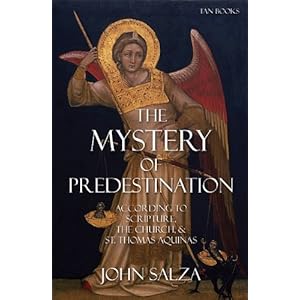

Well, it's not quite that, but John Salza's
The Mystery of Predestination: According to Scripture, the Church, and St Thomas Aquinas
(Saint Benedict Press & Tan Books and Publishers, 2010) is about the clearest introduction you'll find to one of the most impossibly difficult subjects in theology. Here the publisher's summary:
How can an all-loving God choose some people for eternal salvation while permitting others to fall away? Doesn't God offer the same amount of saving grace to everyone? Isn't predestination a Protestant doctrine? In The Mystery of Predestination , author and apologist John Salza, seeks to answer these questions, and others, about that most ineffable and confounding of Christian beliefs: that God chooses to infallibly direct certain people to salvation but not others. Drawing deeply upon Scripture, Sacred Tradition, and the writings of St. Thomas Aquinas, Salza says that a proper Catholic understanding of the doctrine of predestination is interconnected with two other central mysteries: the ability of mankind to choose freely to accept or reject God's saving grace, and the inability of mankind to accept God's grace without first being moved by His grace from within. By holding these truths always before us we can see how God may predestine His elect to heaven but never desire that anyone go to hell. We can also achieve a new clarity and depth of insight into a profound Christian truth: God is the primary mover in salvation. It is He who chooses, seeks, and saves us. Meticulously researched and written in a scholarly yet accessible style, The Mystery of Predestination is perfect for the serious Catholic who is confused by Bible verses or Magisterial statements in favor of predestination (and never hears about it in Sunday sermons), or who wants to defend Catholic truth against Calvinist error, and is seeking clear, traditional, and Thomistic answers. Or, indeed, for any thoughtful Christian who wants to come to terms with what the Bible teaches about the fundamental truths of our salvation.
The author is clearly well acquainted with not only the Biblical literature and Catholic theological tradition, but also with the Lutheran and Calvinist Protestant traditions that take issue, at points, with the Catholic position. This little book is a good place to start for anyone interested in the age-old problem and the debates surrounding it.


7 comments:
We must be frugal for a while. We have so many financial irons in the fire and I have many, many books that I have yet to read so I don’t intend to buy this book. But, does anyone know the bottom line on this? Dare we hope for our family and friends who seem unreachable and indeed may be unreachable if I understand the doctrine correctly? I researched this topic several years ago, isn’t there two interpretations of the doctrine?
Donna
I am reading this book right now myself and am mostly through it. Really well presented.
Donna,
I'm not a theologian and expert in this doctrine, and I haven't read the book. But I have heard concerned souls ask such questions as yours before, and the general answer I have heard from priests and theologians is that we cannot know the eternal destinies of those who die unreconciled to the Church or ignorant of the Catholic faith or of Christ, but that what we do know is that God is merciful as well as just. Cold comfort, perhaps, but what more can possibly be said by anyone who does not know the mind of God himself?
I'm not sure what you mean by "two interpretations" of the doctrine, since there seem to me to have been innumerable interpretations. Still, from what I have briefly read, there seem to have been various conflicts, both in Catholic tradition (Dominicans vs. Jesuit Molinists) and Protestant tradition (Calvinists vs. Arminians), and maybe this is what you mean. One camp may stress more the foreknowledge or sovereign predestinating eternal decree of God, while the other may stress more the contingencies of human free will, making (or seeming to make) God's eternal decree somehow dependent upon whatever human beings will. Catholicism seems generally to emphasize our free will more than Protestants of the Calvinist stripe.
Still, I don't see how either position offers more practical consolation, since we are talking about situations, I assume, in which we do not know what God knows about the heart of our seemingly unreachable loved ones and acquaintances.
Check out the discussion/reviews at amazon.com for Garrigou-Lagrange's "Predestination." Fairly illuminating, at least for this former Protestant Calvinist.
Thank you for this recommendation.
Does the book cover the position of late Fr William Most?
Yes, the book does treat Fr. Most's position quite substantially.
Post a Comment